Geography
Geography Vision
Geography is a valued part of the curriculum where we strive to inspire our children to have an innate curiosity and fascination with the world that we live in and the diversity around them. Our goal is for all children to develop a love of geography. At Blessed Dominic School, we are committed to providing all children with learning opportunities to engage in Geography by exploring, appreciating and understanding the world in which we live and how it has evolved. Geography encourages children to learn through experience, particularly through practical and fieldwork activities.
We believe it is important to build a geographical curriculum that endorses the importance of outdoor learning, to build a curiosity for learning, to help them to know more, remember more and understand more.
The intent of the Geography curriculum is that our children will have a deep understanding of their local environment and the diverse surroundings in the wider world, with an appreciation of human and physical characteristics.
We will deliver a curriculum that:
- Inspires curiosity and fascination about the world and its people;
- Equips children with an understanding of diverse places, people, resources and environments around them;
- It allows children to build on prior learning about physical and human processes and the formation and use of landscapes and environments;
- Develops an understanding that the Earth’s features are interconnected and change over time;
- Encourages exploration of their own environment and challenges pupils to make connections between their local surroundings and that of contrasting settlements;
- Use the local area and community to develop geographical skills and knowledge.
The strands in Geography are:
- Locational knowledge
- Place knowledge
- Human and physical geography
- Geographical skills and fieldwork
Characteristics of a Geographer
At Blessed Dominic Catholic Primary School, we are Geographers. We have…
- An excellent knowledge of where places are and what they are like.
- An excellent understanding of the ways in which places are interdependent and interconnected and how much human and physical environments are interrelated.
- An extensive base of geographical knowledge and vocabulary.
- Fluency in complex, geographical enquiry and the ability to apply questioning skills and use effective analytical and presentational techniques.
- The ability to reach clear conclusions and develop a reasoned argument to explain findings.
- Significant levels of originality, imagination or creativity as shown in interpretations and representations of the subject matter.
- Highly developed and frequently utilised fieldwork and other geographical skills and techniques.
- A passion for and commitment to the subject, and a real sense of curiosity to find out about the world and the people who live there.
- The ability to express well-balanced opinions, rooted in very good knowledge and understanding of current and contemporary issues in society and the environment.
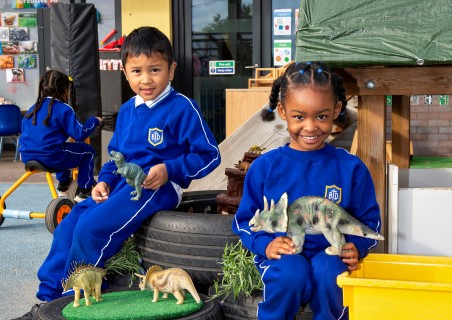
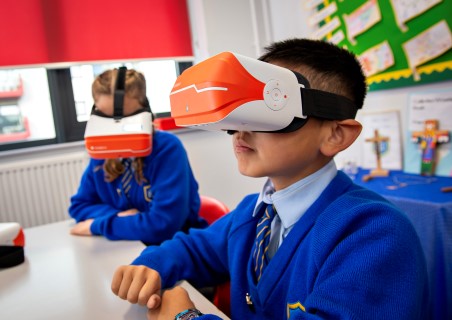
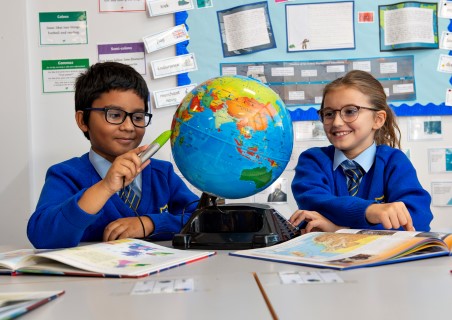
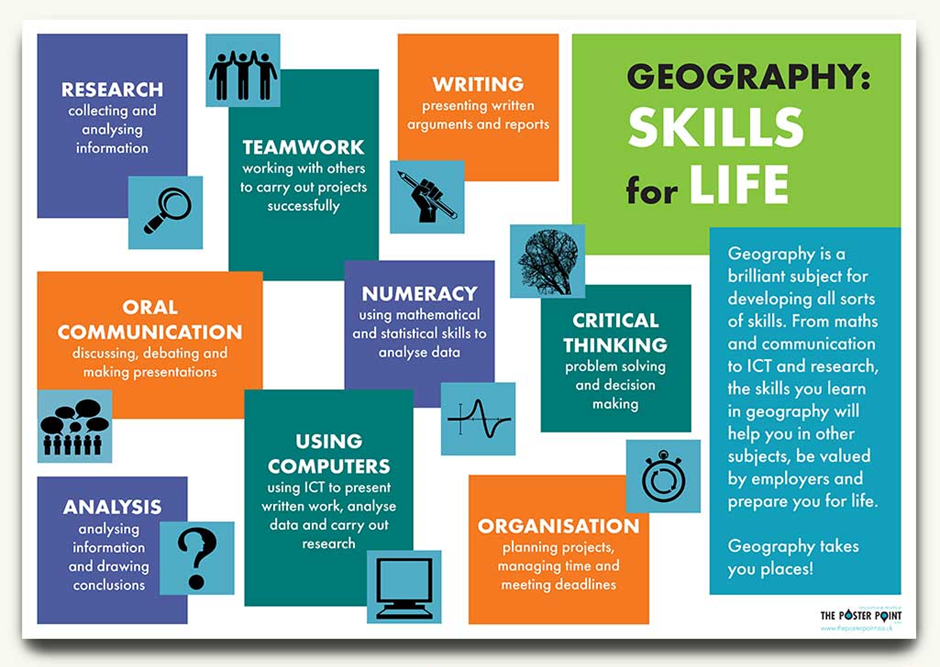
What does this look like at Blessed Dominic Catholic Primary School in…
Our ambitious Geography curriculum is designed to have concepts weaved throughout every year group in order to encourage purposeful repetition to ensure the progressive development of geographical concepts, knowledge and skills. This consistently builds on previous understanding, so that our children are striving to become geographers who understand their own significance in the world which will remain with them for the rest of their lives. The lessons are carefully planned to ensure that all children are well-supported in their learning and that opportunities for depth are planned. We ensure that trips and visiting experts enhance the learning experiences for the children.
Planning in school is structured systematically and has been tailored to the needs of our children, supported by the Twinkl Curriculum' : this ensures that units are in line with our school approach of linked learning and progression of skills. Although a unit may have a particular focus or topic area, the learning is based on the geographical concepts: location, physical features, human features, diversity, physical processes, human processes and map techniques.
EYFS
Within the Early Years Foundation Stage, Geography is included as part of Understanding the World. Children learn to investigate similarities and differences, the local environment and cultures and beliefs, fostering the skills essential to developing historical understanding. This is set out in the early year’s curriculum as children need to:
- Observe, find out about, and identify features in the place they live and the natural world;
- Begin to learn about their own cultures and beliefs and those of other people;
- Find out about their environment, and talk about those features they like and dislike.
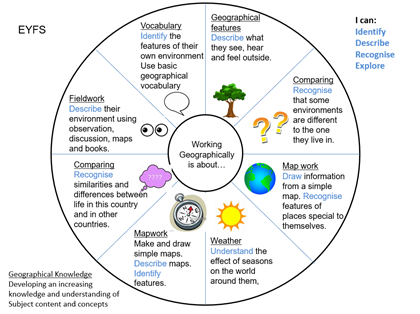
KS1
During Key Stage 1, pupils investigate their local area and a contrasting area in the United Kingdom or abroad, finding out about the environment in both areas and the people who live there. They also begin to learn about the wider world. They carry out geographical enquiry inside and outside the classroom. In doing this, they ask geographical questions about people, places and environments, and use geographical skills and resources, such as maps and photographs.
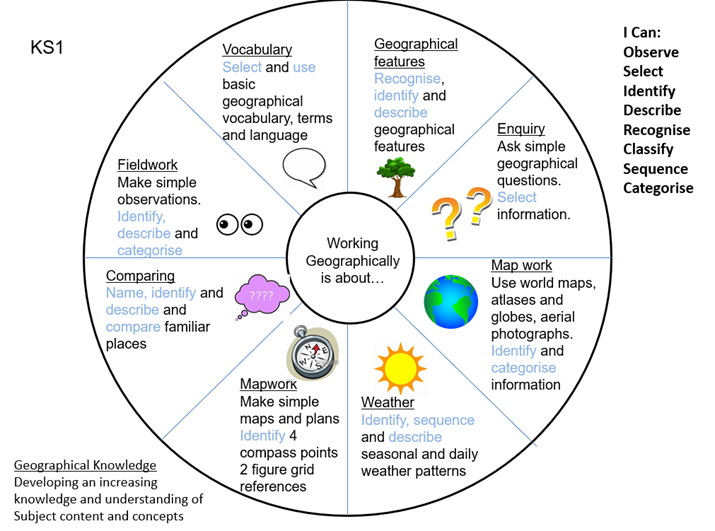
KS2
During Key Stage 2, pupils investigate a variety of people, places and environments in the United Kingdom and abroad, and make links between different places in the world. They find out how people affect the environment and how they are affected by it. Pupils carry out geographical enquiry inside and outside the classroom. In doing this, they ask geographical questions, and use geographical skills and resources, such as maps, atlases, aerial photographs and ICT.
Children develop geographical enquiry skills, including asking geographical questions, collecting and recording information and identifying different views. They acquire the appropriate practical skills associated with Geography, including using suitable vocabulary, fieldwork techniques and maps, plans and atlases. Pupils use secondary sources of information with accuracy, including aerial photographs, satellite images, etc.
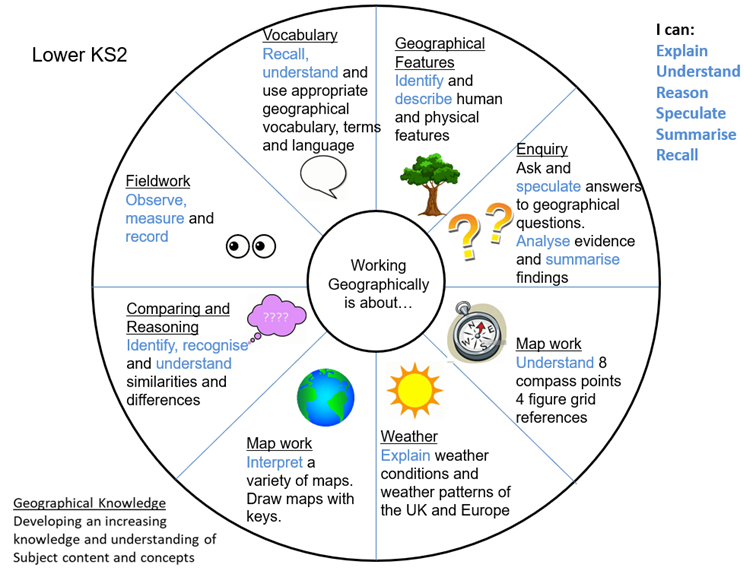
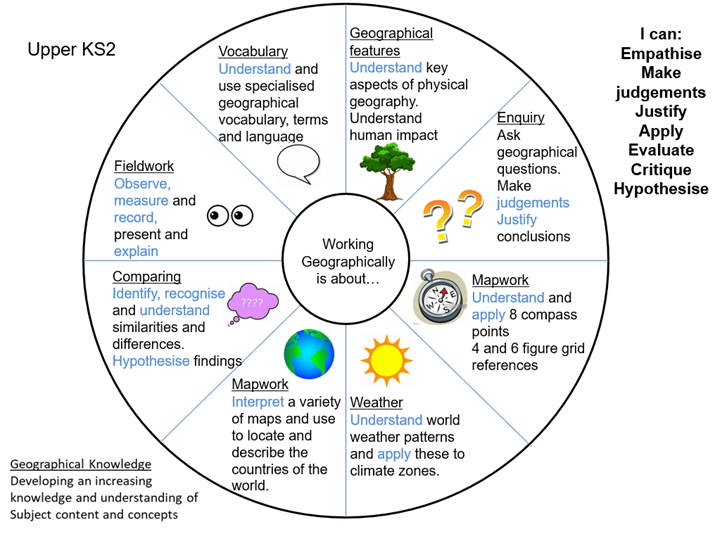
Meeting the aims of the National Curriculum (NC)
To ensure high standards of teaching and learning in geography, we implement a curriculum that is progressive throughout the whole school which enables all children to gain real-life geographical experiences. Our geography curriculum focusses on knowledge and skills stated in the National Curriculum, which provides a framework outlining the knowledge and skills taught in each key stage, which aims to enable pupils to:
- Develop contextual knowledge of the location of globally significant places – both terrestrial and marine – including their defining physical and human characteristics and how these provide a geographical context for understanding the actions of processes;
- Understand the processes that give rise to key physical and human geographical features of the world, how these are interdependent and how they bring about spatial variation and change over time;
Are competent in the geographical skills needed to:
- Collect, analyse and communicate with a range of data gathered through experience of fieldwork that deepens their understanding of geographical processes;
- Interpret a range of sources of geographical information, including maps, diagrams, globes, aerial photographs and Geographical Information Systems (GIS);
- Communicate geographical information in a variety of ways, including through maps, numerical and quantitative skills and writing at length.
Learning sequencing
A coherently planned and sequenced set of lessons is taught using our progression of knowledge and skills document which consistently builds on previous understanding to embed key concepts in the long-term memory. This repetitive approach ensures that geographical concepts are woven throughout every year group in order to encourage purposeful repetition to ensure the progressive development of geographical concepts, knowledge and skills.
Children have opportunities to revisit, apply and extend what they have already covered to ensure that learning is both cumulative and permanent. We believe that this is the best way for children to develop the knowledge and skills needed for mastery of a subject. Teachers know their children’s prior learning, and are mindful of their own end points in relation to the expectations contained in subsequent years. Units of work have also been planned which reflect the current cohort of pupils at the school and each unit also has a sustainability link, so that learning can impact the way in which the children choose to live in today’s world.
Vocabulary
Teachers have high expectations of children to use discussion to further learning. Children are increasingly expected to give precise explanations, using technical and geographical terminology appropriately. Teachers model this practice, using the correct language within all learning. The promotion of a language-rich geography curriculum is essential to the successful acquisition of knowledge and understanding in Geography. This has been made explicit in the Blessed Dominic Progression of Learning Map for every unit of work.
Trips and extra-curricular opportunities
Children regularly access a range of resources to acquire learning through globes, atlases, maps, digital technology and photographs. Regular educational geographical visits from high school teachers, parents and members of the wider community provide vital opportunities for children to enhance their cultural capital by integrating their knowledge into larger concepts and applying to the real-life world.
Planning
Teachers plan lessons to ensure there is a progression of learning that includes providing memorable experiences and knowledge and professional experience can be shared. Our Geography curriculum is high quality, well-thought-out and is planned to demonstrate progression. If children are keeping up with the curriculum, they are deemed to be making good or better progress.
Assessment
Assessments will take the form of quizzes, end of unit pieces of work and teacher assessments throughout the unit. The subject leader will be updated half termly of standards in the subject across all year groups. The subject leader will also participate in a history book looks to gain first hand insight into the progression of pupils work and the standard of their learning and report feedback to the relevant teachers to help inform their future planning.
Challenge
All pupils, especially those with sound understanding, will be challenged, and given the opportunity to deepen and broaden their learning. Teachers will give pupils the opportunity to apply their skills in lessons independently to ensure geographical learning is fully embedded.
Impact
At Blessed Dominic Catholic Primary School, we measure the impact of our curriculum through the following methods:
Pupil Voice
Pupils will show through questionnaires, pupil conferencing and focus groups their understanding and enjoyment of the subject.
Evidence
Books will show work which reflects a pupil’s age and ability. Progression both within and between year groups will be evident and quality of work is consistent. A range of knowledge, skills and activities to apply these will be apparent and evidence of practical activities and trips which support learning will also be evidenced.
Outcomes
Outcomes of work will reflect those planned. The National Curriculum objectives will be met. Outcomes will reflect the age and ability of pupils. Pupils will have access to a broad range of activities and outcomes will reflect the well planned and delivered curriculum.